A Point of View: Is it time for a new British national anthem?
- Published
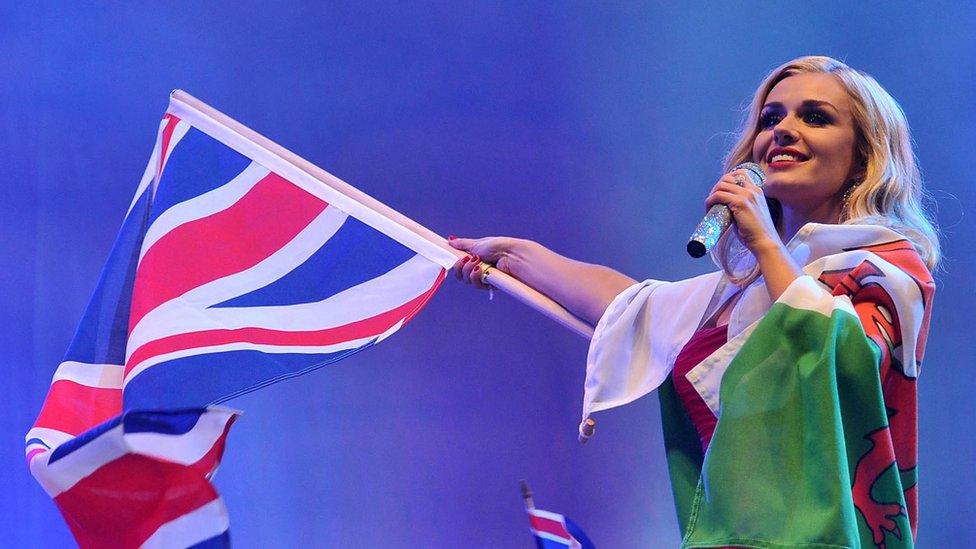
In the week that MPs debated a new national song for England, Tom Shakespeare wonders whether it's time for the UK to consider an alternative to God Save the Queen.
After the terrible events in Paris on 13 November 2015, we heard a lot about the French national anthem, the Marseillaise - including when the members of the French National Assembly spontaneously burst into song, and even at the England-France football match at Wembley a few days later. It was all very stirring, not just because the brutality of the terrorist outrage was so horrifying, but also because of the anthem itself. Let's overlook the fact that the lyrics are very gory, full of impure blood soaking fields and tigers mercilessly ripping their mother's breast. The point is that La Marseillaise sounds marvellous, and brings a tear to the eye. In other words, it is does the job of a national anthem, which is rallying "les citoyens", superbly.
Here in Britain, the leader of Her Majesty's Loyal Opposition got into trouble recently when observers noticed that he was failing to sing our national anthem. But I don't blame him myself. It's a terrible tune, with banal lyrics. God Save the King was first sung in 1745, when Bonnie Prince Charlie, the Scots pretender to the throne of Great Britain, had just beaten a Hanoverian army near Edinburgh, and the English needed rallying. After 270 years, we have different enemies, and I humbly propose it's time we had a new anthem. Last week, I gave my view on House of Lords reform, and today I want to put 21st Century British patriotism on a secure footing. Because I agree with George Orwell that while nationalism is an evil in the world, patriotism has its place. Unlike our US cousins, we Brits feel rather embarrassed about patriotism. My friends in Norway and Switzerland regularly fly their national flag in outside their houses. If I did the same, my neighbours would think I was a fascist. I oppose nationalism, but at the same time, I'm a patriot. To quote George Orwell: "By 'patriotism' I mean devotion to a particular place and a particular way of life, which one believes to be the best in the world but has no wish to force on other people."
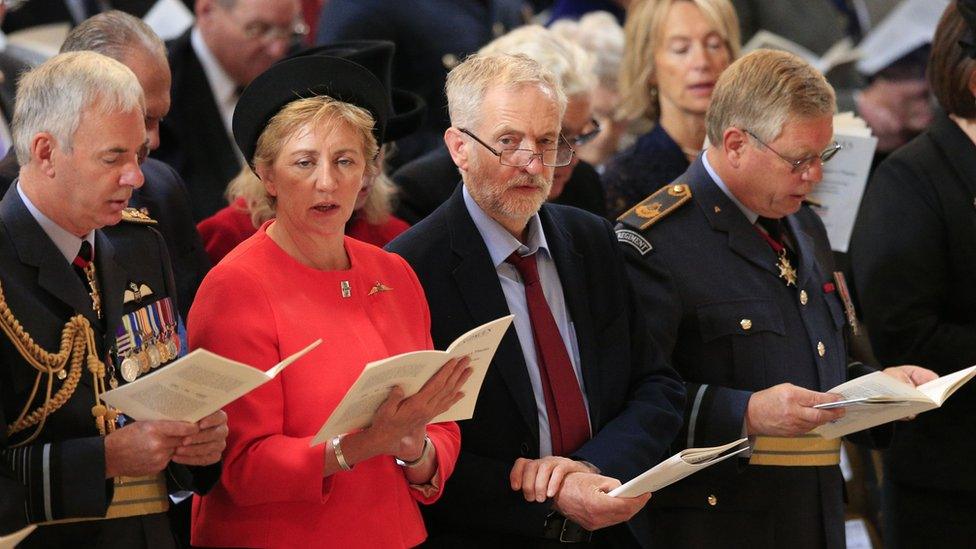
So if we're agreed about feeling patriotic, what could possibly be wrong with God Save The Queen? Well, it's meant to be a national anthem, but it actually doesn't have anything to say about England, Wales, Northern Ireland or Scotland (in fact a version briefly popular in the 18th Century added a final verse about crushing the "Rebellious Scots"). Instead, our national anthem variously discusses saving, protecting and defending the monarch, and pouring gifts on her. Whatever your views on the Royal Family, I do not think they fully personify the diversity and vibrancy of contemporary Britain. Our national anthem is very dated, and it mentions God in 12 separate places, which may be of some concern to those Britons who no longer believe in the deity. The phrase "Thy choicest gifts in store" sounds like a supermarket advert, and "knavish tricks" is all too reminiscent of the Bullingdon Club.
Above all, it's a wasted opportunity to celebrate what's great about Britain. In contrast, I'd point to Advance Australia Fair.
"Australians all let us rejoice / For we are young and free / We've golden soil and wealth for toil; Our home is girt by sea; Our land abounds in nature's gifts / Of beauty rich and rare / In history's page, let every stage / Advance Australia Fair".
The message is all about sharing and working together, the tune's unquestionably stirring, and it has that great refrain. It's cheesy, but it's top-quality cheese. No wonder the Aussies voted for Advance Australia Fair to replace God Save The Queen back in 1977.
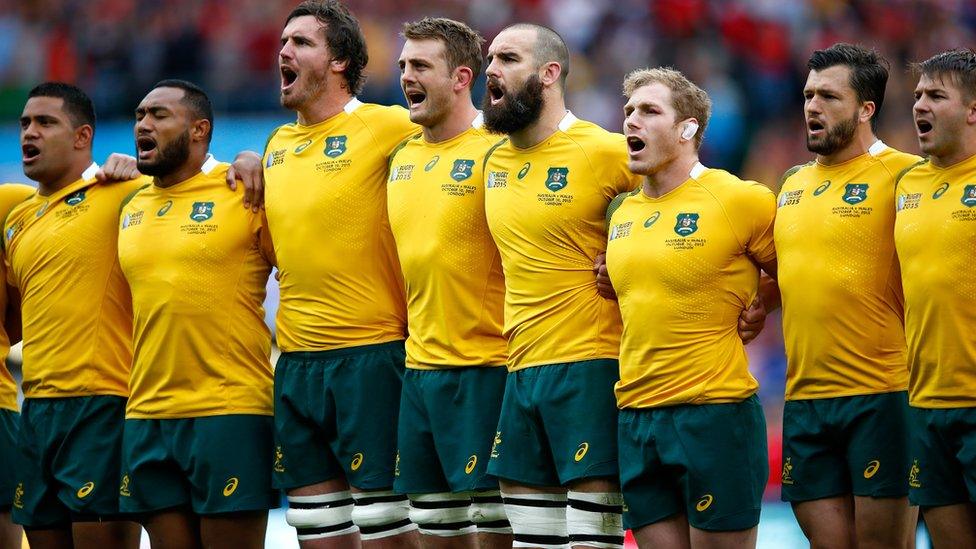
The Australian rugby team belt out their national anthem before a World Cup match at Twickenham
So if we were to agree to do likewise, what would we choose? We need a song that even the tone deaf have a chance of singing effectively. There is a great advantage to familiarity. The frontrunners among the existing candidates would seem to be Land of Hope and Glory, Rule Britannia and Jerusalem.
In a BBC poll in 2006, 55% of people preferred Land of Hope and Glory as a national anthem for England, and of course it's sung regularly by supporters of the England rugby team. But Land of Hope and Glory is hopelessly imperialist and also has rather too much God in it, and for those reasons I'd rule it out.
Rule Britannia is very familiar from jingoistic renderings at the Last Night of the Proms, as well as being associated with the navy, what with all that ruling of waves. The second verse is perhaps rather smug and inappropriate in these days of the European Union:
"The nations, not so blest as thee / Must, in their turns, to tyrants fall; / While thou shalt flourish great and free, / The dread and envy of them all."
I am not sure that dread and envy is quite the tone we are going for currently, what with the emphasis on international trade and free movement of persons.
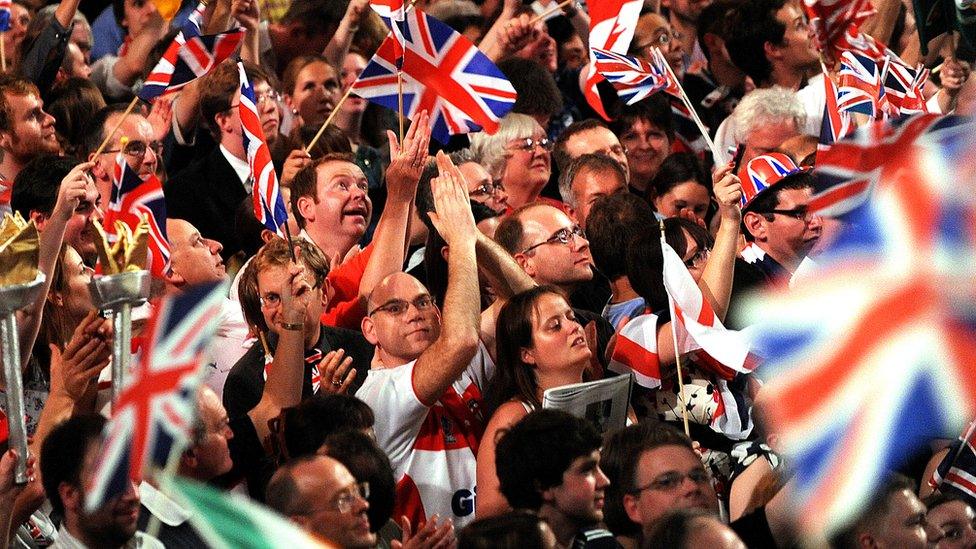
The last night of the Proms
I heartily approve of Jerusalem, being a fan of William Blake. I remember it from school, when we sang it on the last day of the summer term, so for me it has a strong association with liberation. Although Blake was a radical who was interested in building a new Jerusalem, most people, particularly rugby fans, know his poem in the Hubert Parry version. This song was first published at the height of World War One, to rally the public at a time when there was revulsion at the number of casualties. However, Jerusalem was taken over by the suffragettes as the Women's Voters Hymn, with Parry's approval, which is why it is now the anthem of the Women's Institute. Jerusalem was then adopted by the Labour Party after its 1945 election victory, and has also been sung by the Conservative Party and the Liberal Democrats, so it obviously has cross-party support.

The man behind the music - Hubert Parry
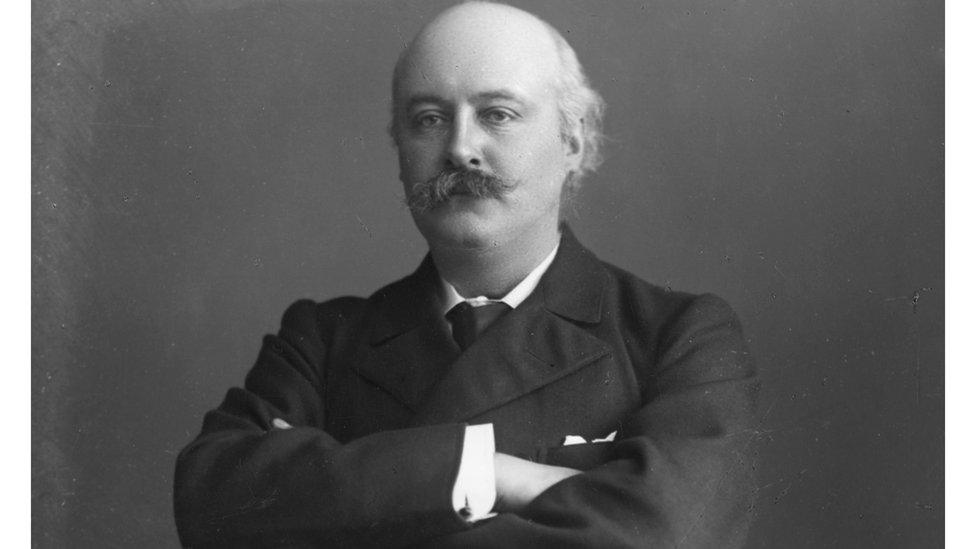
Born in 1848 and died in 1918
Worked in insurance before making his name as a musician
Taught composers Ralph Vaughan Williams and Gustav Holst
Jerusalem was his contribution to the war effort, although he was sceptical about patriotism
His piece "I Was Glad" has been performed at two royal weddings: William and Catherine in 2011, and Charles and Diana in 1981

As well as its association with rugby, Jerusalem is the official anthem of the England and Wales Cricket Board. George V apparently preferred it to God Save the King. But Jerusalem is very much an English national anthem, not a British one. It's all about walking on England's mountains green, which would exclude the Welsh and Scots and Irish (not to mention those of us who live in the fens). Our northern cities - once home to those Dark Satanic Mills - might also take exception.
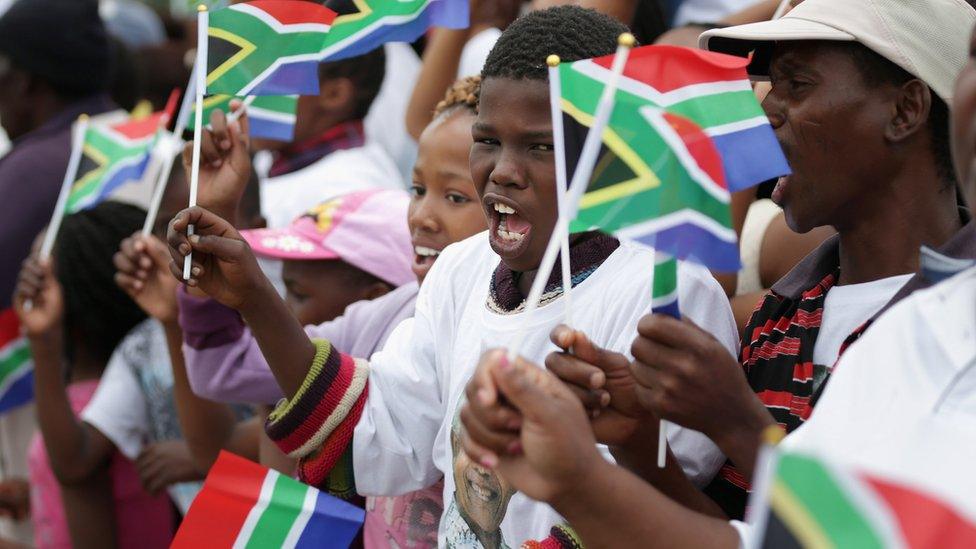
All these memorable songs have limited relevance to how we live today. If I had my way, I would prefer us to find a new anthem, one that was stirring and memorable, but also said something about British values - fairness, inclusivity, politeness and probably also self-deprecation. Like the South African anthem, Nkosi Sikelel' iAfrika, wouldn't it be great if it had a line or two from each of our national languages - Welsh and Lowland Scots and Irish and Scots Gaelic, as well as English? I would like the new anthem to be aspirational, but also recognisable. It should probably mention the weather at some point, and not be entirely serious. Given these requirements, it's obvious that we should nominate Alan Bennett or even an Anglophile American like Bill Bryson to draft us something. For a tune, I am sure Victoria Wood or Elton John or Billy Bragg would be glad to help. These national treasures would undoubtedly come up with several options for words and music.
Then, as everyone seems to enjoy the Eurovision Song Contest so much, we could have a competitive telethon to decide which of these options offer the best lyrics and tune to represent the United Kingdom for the next century or so. I foresee an innovative new television format, along the lines of Strictly Come Dancing or The Choir, but with the best features of the opening ceremony of the London Olympics.
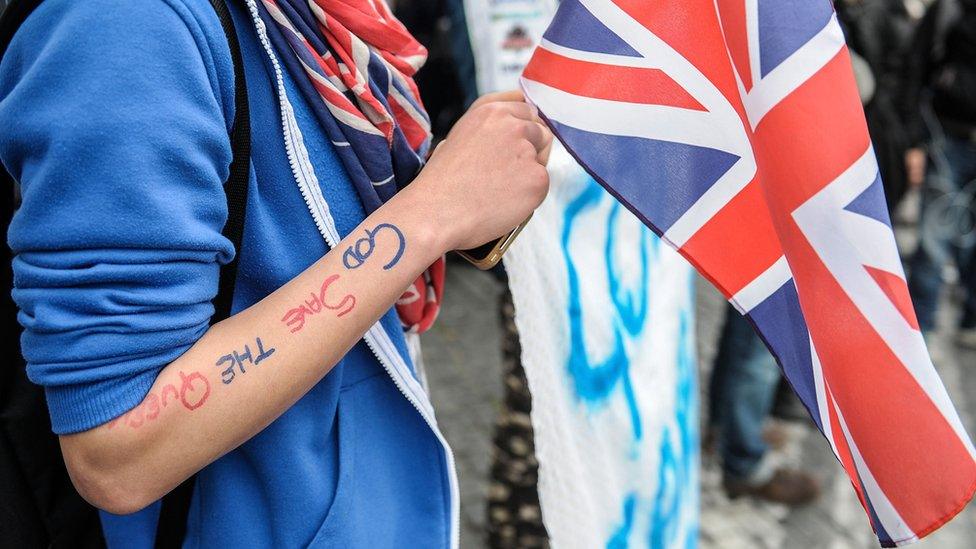
The result would be a rebirth for patriotism, an anthem that we could all be proud of and feel ownership of and sing without reservation. We could keep God Save the Queen for royal occasions such as Windsor birthdays, weddings and funerals, but for future sporting engagements and public events and international crises, we would sing the new national anthem because it would actually mean something. It would make us feel proud of what's Great about Britain and Northern Ireland. We would be in tune with our times.

More from the Magazine
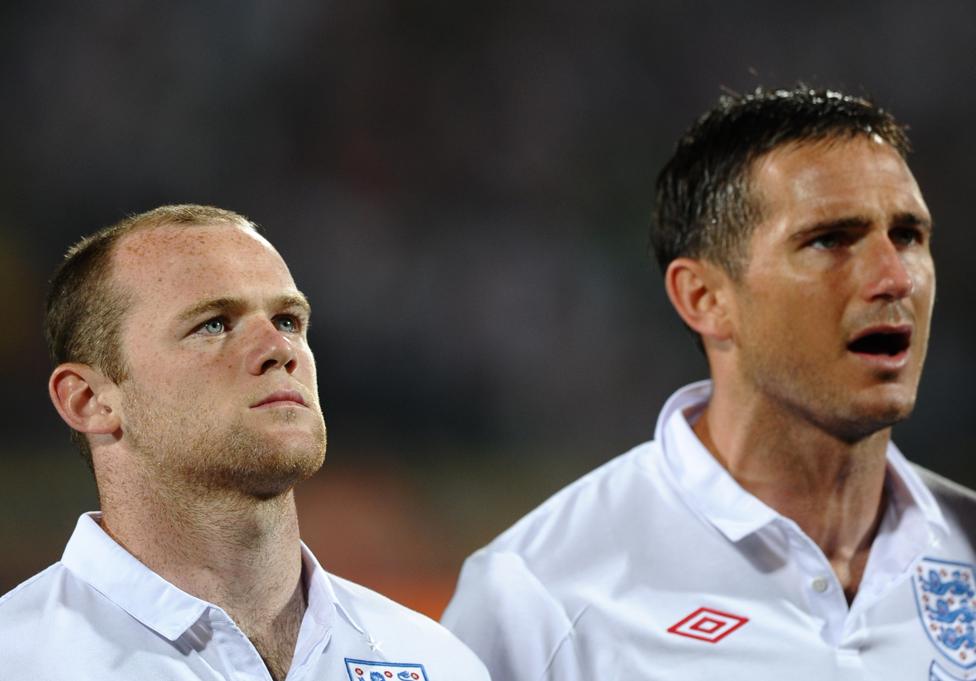
England's striker Wayne Rooney at the 2010 World Cup
Wayne Rooney and Jeremy Corbyn have been criticised for staying silent while others sing God Save the Queen. What are people's reasons for refusing to sing along?
Why some people don't sing the national anthem (September 2015)

This is an edited transcript of A Point of View, which is broadcast on Fridays on Radio 4 at 20:50 GMT and repeated Sundays 08:50 GMT or listen on BBC iPlayer.
A selection of your comments
The whole point of the debate was that England doesn't have its own anthem whereas the Scots and Welsh do. We don't need a replacement for God save the Queen, we just need a separate anthem for England. If it were not already being used to such good effect I would steal the Marseillaise and have some rousing English words set to that wonderfully uplifting music. But as the Marseillaise is not available, in my view, Land of Hope and Glory is the right choice.
Christopher H Sheldrake, Dorset, UK
I'm no republican and have nothing against the Queen or the royal family but I think our current national anthem is inappropriately imperialistic in the pluralist society of the 21st century. "Send her victorious" suggests invasion of, or at least supremacy over, other nations. This is the sort of thing that breeds conflict not peace, and that's why it's totally inappropriate. Narrow nationalism is unhealthy and contrary to the cause of world peace and tolerance. And why do we ask God to save the Queen in particular? In some respects she may be the one least in need of salvation.
Paul Graeme, Kent, UK
It is not the bloodthirsty lyrics or boasts of empire that require replacement but the simple fact that no man should surely be truly glad at heart and ready to fight the foe, sporting or otherwise, when he has to sing of his desire to be the subject of a monarch and bellow his need to be reigned over for ever. How cringing is that? Let us, like so many other nations sing of a land of our fathers and a land to be inherited by our sons and daughters. Something in which we can surely all be proud. Most definitely a vastly superior claim to that of a desire to live eternally as subjects of a ruling dynasty which should have no more rights than any other true son or daughter of this nation. To sing the praises of such a family simply because of an accident of their birth should be a subject of ridicule in a developed nation in the Western world. That an educated nation such as ours can be so obsequious and genuflecting is surely a matter for shame. Let us as a nation hold up our heads and sing to the world our joy and heartfelt belief in freedom for ourselves and our children in this wonderful country of ours.
Ron Hill, Herefordshire, UK
What is required is not a new British anthem, whose appropriation by the English would be equally offensive in Wales and Scotland whatever its text precisely because it was British and therefore Welsh and Scottish as well as English, but a specifically English anthem to be sung before England matches, leaving God Save the Queen for matcheS in which the entire union plays as one.
Leofranc Holford-Strevens
The only sensible and universally acceptable expression of Britishness for a national anthem is The Chicken Song as popularised by Spitting Image.
Nigel, York, UK
Subscribe to the BBC News Magazine's email newsletter to get articles sent to your inbox.